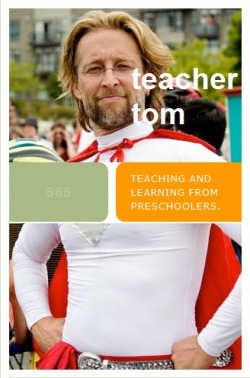 teacher tom. Who wouldn't love to arrive at a school where your teacher wears a cape? A teacher who says his blog is from the children? Who wouldn't love to send their child to a teacher who loves their job so much he says, "I intend to teach at <insert your school name here> for the rest of my life". A teacher who not only shares what your child has done, but why and how. Who makes learning looks like such good messy fun. Who can make anything out of anything and show you how to do it too. At a time when the future for creative learning in the UK looks quite depressing, it gives me hope to read what people like teacher tom are doing, it makes me smile about what children can achieve in good hands. Imagine if all teachers were like teacher tom. Incidentally if you go to his blog and click on his profile, you'll see a list of other blogs teacher tom follows, many of which are equally wonderful. If you know of any other great teacher blogs, so share them in the comments below, I'd love to see more.
0 Comments
In evaluation, looking at outcomes is vital. When you've invested in a project of course you'll need to know what was achieved and where there are still gaps. But it can be cumbersome reading mounds and mounds of text in a report. Charts, graphs and percentages can help clarify, but can still make for dull reading (and for some feel too much like maths homework).
To help busy partners to any project, finding a variety of ways to report on activity can make all the difference between people remembering what went well and being able to advocate the value of their work... or not. I've recently been creating a toolkit for early years practitioners looking at how creative engagement can help achieve new and unexpected results. Its aim is to be quickly digestible and highly practical. The toolkit is based on the activity of ten creative early years projects in schools and Children's Centres in the North of England. The projects were mapped against the Early Years Foundation Stage six areas of learning. To illustrate which of the EYFS outcomes the projects really brought to life, I used wordle to create this at a glance illustration. The larger the word, the more presence it had in the projects. You can see here Personal, Social and Emotional development was the strongest feature across the programme overall. It doesn't replace the need for writing other information in the report of course. However the teachers, children's centre staff and creative practitioners involved, and readers of the toolkit, can now instantly see where the projects thrived and what kinds of outcomes similar work might expect to achieve, so much more quickly and easily than deciphering a big chunk of writing or trying to analyse a graph. 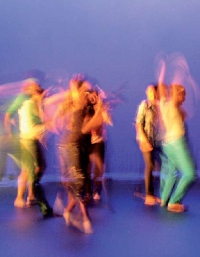 For several years there has been debate about the potential for using the arts to help improve literacy and numeracy (and other subjects). For many arts organisations being able to find ways to achieve this has been a necessity to survive. For some this raises discomfort, those who feel it's not what the arts are for and can run the risk of people losing sight of other benefits that perhaps are more intrinsic to artistic practice. Personally I don't choose one side or the other of the argument, there are truths and benefits (and no doubt pitfalls) either way. Though I do know this - for children and young people who for whatever reason are not as developed as their peers in language and numeracy skills, the arts can present a more accessible way to unpick learning that some other formats. I've seen it happen first hand. I can't say for sure it's specific to the arts - I do think it's something about a creative approach generally and the opportunity to work in different environments and include kinaesthetic activity. All of which is common, but not exclusive, to arts activity. However - last year I was asked to work with the inspirational arts producer Elizabeth Lynch to evaluate Performing for Success. An arts based project building on the proven achievements of Playing for Success (which used sports to improve young people's numeracy and literacy skills). It was a unique programme in that it met Extended School agendas and relied on partnerships between extended school deliverers experienced in sport, and arts or cultural organisations. However there was no national model, each pilot area approached the structure in different ways, some more effectively and successfully than others. It was DCFS funded initiative but not via the 'usual' channels (such as Find Your Talent or Creative Partnerships) but through an independent education contractor, Rex Hall Associates. In the current climate who can say what will happen to these kinds of initiatives. However if you'd like to read our response to the programme you can download it *here* UPDATE: I have learned that Rex Hall sadly passed away on May 31st. My experience of working with him was brief but so inspiring to see first hand the difference one person can make. My thoughts and wishes go to all of those close to him. 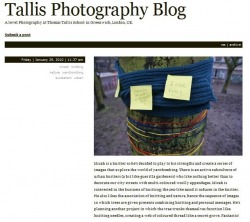 "Micah is a knitter" That was about all we knew from the tweet on creativetallis twitter stream but it was enough to hook me. CreativeTallis is a part of one extraordinary school's social media activity I've been following for some time now. Most schools now have something called a Virtual Learning Environment. It's a bit like an intranet but with some real web functions like blogging and podcasting. Personally I don't quite understand their purpose. If you want young people to experience the potential of broadcasting and publishing their work 'out there' then in my view the internet is the better way to do it. I appreciate schools have a responsbility for safety, which means many still sit behind resilient local authority firewalls with not much of the real world getting in or out. But if young people are going to access the web anyway in their own time, and they are, is it not more responsbile to help them understand how to do that safely, rather than pretend the world wide web isn't really there? And so CreativeTallis (actually Thomas Tallis school in London) is a leader in this approach for schools in my view. They present a range of websites, blogs, twitter streams, webcasts and more. In the past I've watched them create a 3D city-scape thorugh a live webcast, and been able via twitter, to ask them questions about what they were doing and why, and have students reply to my questions in real time. Through this kind of innovative approach, the school is able to demonstrate how students learn with a passion and excitement, stimulating curiosity and sharing, celebrating and exploring individuality. Importantly students are encouraged to help steer and develop their own learning, and have the know-how to recognise and reflect on their experiences. And so it is I knew that unusually, Micah is a knitter, would be the starting point to find out more about one student's experience of education. Micah is also a person, an individual, and knows how to celebrate that thanks to the realistic, practical, relevant, yet utterly 'out-there' work of his school. The DCSF recently released this guide to learning, playing and interacting in Early Years.
It's my belief that a huge amount of good practice in early years learning and development can be transfered to older age ranges and indeed other non-education work. The general premise of creative exploration as a means to find out and enjoy all the opportunities that are out there must be a effective approach for anybody. Jo Graham of Learning Unlimited, who has significant experience of working with early years development particularly in the South of England, and especially with museums, talks more about the values of the publication and how mow museums staff might use it in their thinking and planning... 4/12/2009 ICT / Digital Media Creative Practitioner wanted for cultural story telling primary school projectRead NowThe final project I'm publishing recruitment details for. A city centre Manchester school are looking for an inspiring creative practitioner to help them get to grips with ICT and new media through story telling of some of the many cultures present in their children's lives. Full details available to download below. Deadline: Monday 14th December
2/12/2009 Creative Practitioner wanted for transfering early years / child-led learning approach to a year 3 classroom.Read NowAnother creative practitioner is required, this time for a primary school in Wilmslow, Cheshire, who want to take some of the best practice of early years activity and find appropriate ways to transfer this to their year 3 (age 7) class. We're anticipating this person might be an early years creativity / early arts specialist who can trial how this approach might work in a classroom with older children; or a creative pedagog who is able to bring expertise of child-led learning to creative curriculum exploration in the classroom. Full details available to download below. Deadline: Fri 11th December
As part of a project I'm overseeing in North Manchester / Rochdale, the school I'm working with is looking to recruit a creative practioner who can explore sensory creativity with primary aged special needs and mainstream children. We're particularly interested in finding someone who can include visual art / design / craft in the work, and possibly include the school's outdoor spaces, potentially developing temporary additions to these spaces. Full details available to download below. Deadline for applications: Friday 11th December
Creative practitioner wanted for a project I'm overseeing with two primary schools in Cheshire. We're looking for someone interested in collaborating with teachers and children to develop children's thinking skills, working with a theme of The Great Outdoors, who can explore geography and cross-curricular ideas, and knows about, or is prepared to learn from a lead teacher about Independent Thinking Skill techniques. Full details available to download below. The deadline is Thursday 10th December. There will be some more of these briefs appearing over the next few days so keep looking.
The Equality & Human Rights Commission (EHRC) have launched a new set of resources for teachers.
A series of topics use the arts as a basis for exploring citizenship scenarios with pupils. There are seven suggested topics, created to support schools entering this years's EHRC Young Brits at Art awards. However the resources are freely available for anyone to access and are relevant to anyone working with young people. Each topic includes background ideas and information for teachers, an example scenario for teachers and pupils to explore together, and describes the work of a number of contemporary artists working in ways relevant to the topic outlined. The topics include: Your Rights - stemming from the United Nations Rights of a Child the topic explores the theme human rights and children's rights. Homophobic Bullying - exploring homophobic bullying in schools and other places young people meet. Class Divides Our Futures - asks about how children and young people become judged and channelled into certain schools, roles and careers based on perceptions about their social class. Staying On - looks at implications for young people in terms of changes to the law about their education and training. Wild Child - explores adult misconceptions compared to the realities of children's and young people's behaviour. Creativity as Empowerment - how can we use creativity to remove barriers for people with disabilities? Resources here Awards information here |
Details
...BlogI'm most interested in how the public, your public, whoever that may be, engages with culture and creativity.
And if it nurtures creativity and develops personal, social or professional skills I'm absolutely all ears. Categories
All
Archives
May 2023
|
||||||||||||||||||||||||

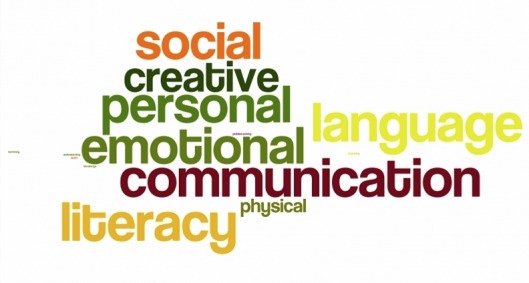
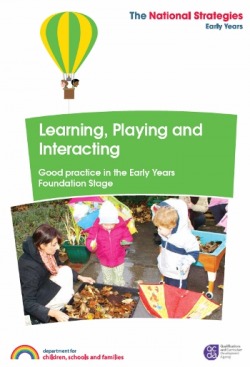

 RSS Feed
RSS Feed
